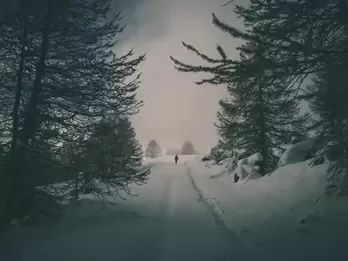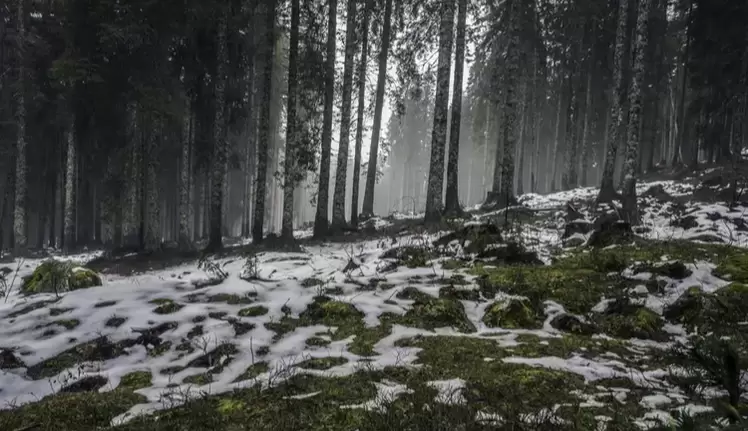|
I grew up in a place where there were harsh winters. Though we found plenty to do playing outside sledding and ice skating in spite of the cold, our activities and pace were different during the winter than during the other seasons. When I was in my late 30s, I moved to California for a few years. Folks living there would talk about having winter, but to someone who grew up on the Canadian border in the Midwest, it seemed like one long non-winter to me. I found myself longing for that change of pace that the frigid weather brought.  A recent New York Times opinion piece by Charlie Warzel reflected on how this COVID time has been a 'wintering' for all of us. Warzel had read the book, Wintering: The Power of Rest and Retreat in Difficult Times by Katherine May. The book was not written in response to this time of COVID, but rather to talk about the importance of having a ‘wintering’ whenever we encounter something difficult. She defines wintering as, “a fallow period in life when you’re cut off from the world, feeling rejected, sidelined, blocked from progress, or cast into the role of an outsider.” Have you felt that during this COVID time in some way, or at another time? I certainly feel I have been through a time like that. Even though we are just coming off of seasonal winter in Minnesota, where I live, I resonated even more with the concept of the cultural and personal wintering that has been happening with less busyness and distraction or even the usual connection with others. We've had to do life differently. These have been and continue to be unusual times. Many of us have lamented the quieter days with fewer choices in places to go. Many have talked about ‘COVID fatigue’ where we lack interest or motivation to do things. It may be that we are still finishing our wintering. What has this time added to our lives, as well? How can we take some of what we may have learned forward as our world opens up bit by bit? When I studied Asian medicine, I learned the important role seasonal changes played for our bodies and our well-being, rather than the perpetual “go forward” of our American culture. I ponder how this time may have shifted our culture as a whole. We likely aren't simply going back to 'normal' as we have talked about. How has this time of change been gift for you? Here are some questions for you to reflect on about our collective wintering:
When I work with folks who are newly retired or who are realigning how they live in retirement, I will often see people with the expectation they need to fill their hours and if they don’t, they’ve somehow failed. I advocate for some quiet time in each day, or better yet a patch in the week. It's a little wintering energy to take in all the change that is happening, particularly at the beginning of retirement. Some folks choose to have a longer wintering time after they retire and simply do nothing for an extended period of time. That may not be right for everyone, but may be a need for some.  On a larger scale, as May talks about in her book, there will be times when things happen in your life for which wintering may become beneficial or even necessary. It is not often part of our life planning. We value staying active and involved. But there is great power in a time of being quiet and still. In what ways can you plan life so you have the foundation and structure in your life to be free for wintering in the future? Most of us assume we will go full steam ahead in the years to come. But it may be a great health practice to at least ponder the possibility of, if not become at peace with, wintering at times. I have been wondering how can we learn to talk about our wintering with each other? We are so good at talking about all that we have been busy with. How might the intimacy of those conversations build new depth in our relationships? Who do you know around you who is having a wintering time? Can you hear about their season vs. do you feel the need to rush in and try buck them up? Can you tell someone about your winter? When we allow ourselves, seasonally or otherwise, the opportunity of wintering, a spring will eventually come along, bit by bit. Spring is a time where we can celebrate new discoveries, new hope, new growth, new satisfactions, and the world will take on new color…based on the underground work of winter. It only comes when we are ready to get there. References: May, Katherine. Wintering: The Power of Rest and Retreat in Difficult Times. New York, Riverhead Books, November 10, 2020. Warzel, Charlie. Why You Should Adopt a Seasonal Mind-Set. New York Times, April 5, 2021. https://www.nytimes.com/2021/04/05/opinion/katherine-may-winter-covid.html?smid=tw-share
6 Comments
|
AuthorRuth Tongen helps people plan and live meaningful, fun and healthier retirements. Archives
January 2022
Categories
All
|
|
Ruth Tongen 952-223-1121 [email protected] www.ruthtongen.com Copyright © ruthtongen.com. All Rights Reserved. |
Questions or to
Schedule a Free Consultation Sign up to receive Meanderings:
The New Retirement via email x
Receive a copy of Meanderings: New Ideas for Retirement in your email.
|



 RSS Feed
RSS Feed
